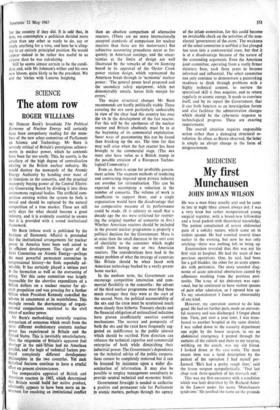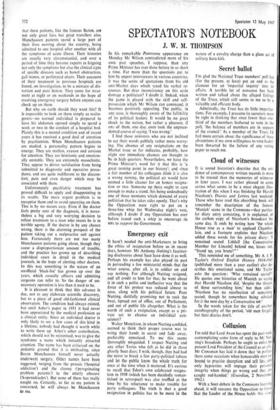My first Munchausen
MEDICINE JOHN ROWAN WILSON
He was a man (they usually are) and he came in late at night (they almost always do). I was a very keen but rather inexperienced young surgical registrar, with a brand-new fellowship and a head packed with theoretical knowledge. The patient complained of severe abdominal pain of a colicky nature, which came on in violent spasms. He had vomited several, times earlier in the evening, but now he was only retching—there was nothing left to bring up.
Examination revealed that this was not his first visit to hospital. He had the scars of two previous operations. One, he said, had been for a gall bladder, the other for an acute appen- dix with peritonitis. The story sounded diag- nostic of acute intestinal obstruction caused by adhesions resulting from the previous peri- tonitis. The x-ray of his abdomen was equi- vocal, but he continued to have violent spasms of pain after admission, so I opened him up. To my astonishment I found no abnormality of any kind.
However, my operation seemed to do him good. He had no further pain, made an unevent- ful recovery and was discharged. I forgot about him. Then, just over a year later, I was trans- ferred to another hospital in the same district. I was called down to the casualty department one night by the house surgeon, to see an abdominal emergency. 1 peeped through the curtains of the cubicle and there to my surprise, writhing on the couch, was my old friend. I looked down at the case-notes. The most recent item was a lurid description by the patient of the operation I had myself per- formed. 'He's had a pretty rough time,' said the house surgeon sympathetically. 'That last chap took three-quarters of his stomach out.'
This was my first encounter with a condition which was later described by Dr Richard Asher in the Lancet under the name 'Munchausen syndrome.' He justified the name on the grounds that these patients, like the famous Baron, are not only great liars but great travellers also. Munchausen patients spend a large part of their lives moving about the country, being admitted to one hospital after another with all the symptoms of acute illness. Their histories are usually very circumstantial, and over a period of time they become experts in feigning not only the symptoms but also the clinical signs of specific diseases such as bowel obstruction, gall stones, or perforated ulcers. Their accounts of their treatment in previous hospitals are found, on investigation, to be a mixture of dis- tortion and pure fiction. They come for treat- ment at night or on weekends in the hope of receiving emergency surgery before anyone can check up on them.
But why on earth should they want this? It is impossible to look on them simply as malin- gerers—no normal individual is prepared to have his abdomen opened simply to spend a week or two in the comfort of a hospital bed. Plainly this is a mental condition and of recent years it has received a good deal of attention by psychiatrists. When Munchausen patients are studied, a personality pattern begins to emerge. They are restless, evasive and anxious for attention. They are histrionic and emotion- ally unstable. They are extremely masochistic. They appear to derive satisfaction from being submitted to diagnostic and operative proce- dures, and are quite indifferent to the discom- fort, pain and even danger which may be associated with them.
Unfortunately psychiatric treatment has proved difficult to apply and disappointing in its results. The more urgent problem is to recognise them and to avoid operating on them. This is by no means easy. Even if the doctor feels pretty sure of the diagnosis, it is never- theless a big and very worrying decision to refuse treatment to a man who insists he is in terrible agony. If the doctor is by any chance wrong, there is the alarming prospect of the patient taking out a malpractice suit against him. Fortunately there are not too many Munchausen patients going about, though they cause a disproportionate amount of trouble, and the practice has grown up of describing individual cases in detail in the medical journals, in the hope of alerting other doctors. In this way something in the nature of an unofficial 'black-list' has grown up over the years, which casualty officers and admitting surgeons can refer to. So the danger of un- necessary operation is less than it used to be.
It is pleasant to think that this advance is due, not to any elaborate scientific discovery, but to a piece of good old-fashioned clinical observation. The condition had always existed, but until Asher's paper in 1951 it had never been appreciated by the medical profession as a clinical entity. Since an individual doctor is only likely to see a few cases of this kind in a lifetime, nobody had thought it worth while to write them up. Asher's other contribution, which should not be minimised, was to give the syndrome a name which instantly attracted attention. The name has been criticised on the pedantic ground that it is misleading, since Baron Munchausen himself never actually underwent surgery. Other names have been suggested, verging from the prosaic ('hospital addiction') and the clumsy ('peregrinating problem patients') to the utterly obscure ekopenickiades). But none of them has really caught on. Certainly, so far as my patient is concerned, he will always be Munchausen to me.































 Previous page
Previous page